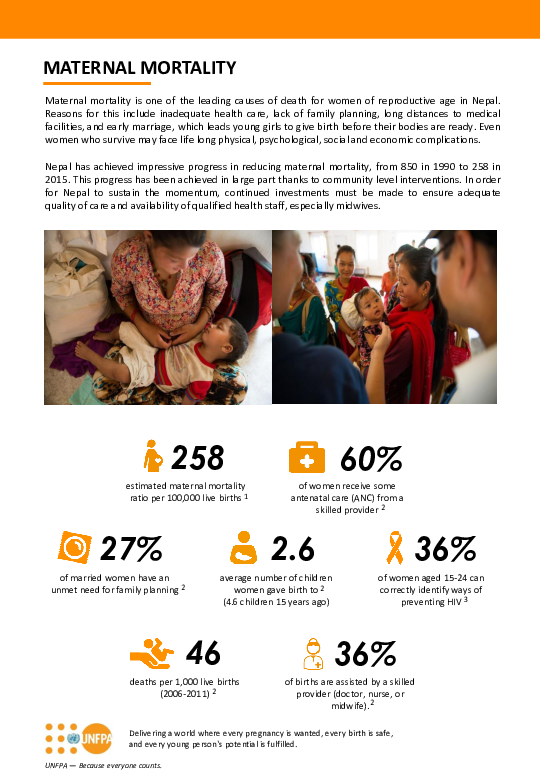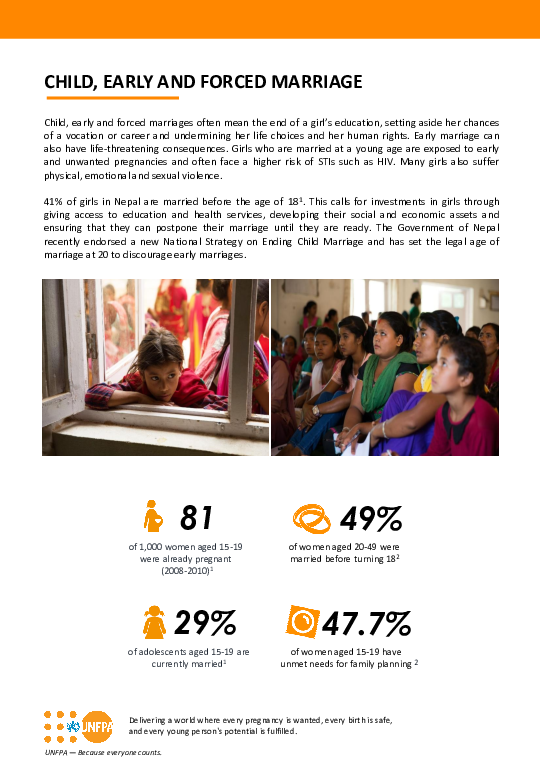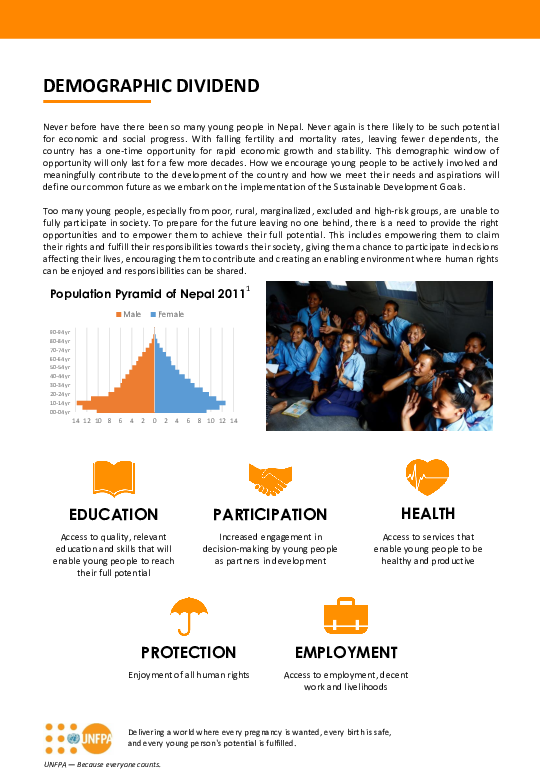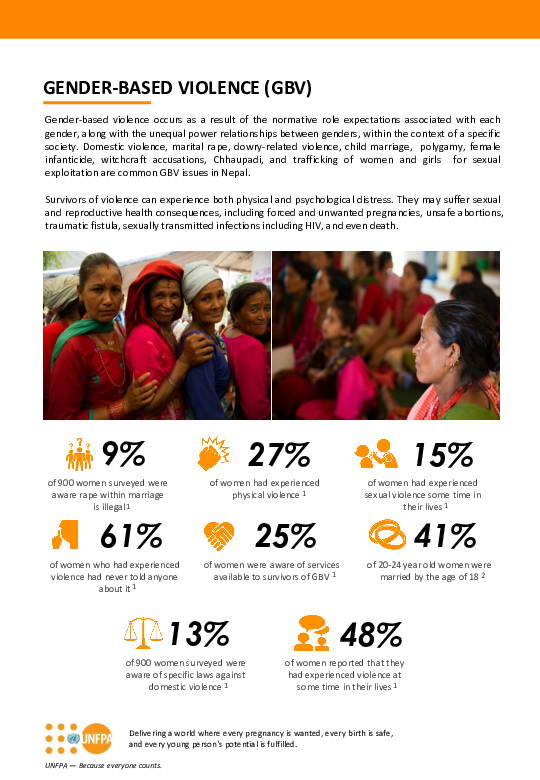You are here
New Releases
Study on Selected Reproductive Health Morbidities among Women Attending Reproductive Health Camps in Nepal
These publications are a summary of the Study on Selected Reproductive Health Morbidities among Women Attending Reproductive Health Camps in Nepal and a presentation prepared for the 4th National Safe Motherhood Conference held in Kathmandu on 15 November 2016. The study aims to determine the prevalence of selected reproductive health (RH) morbidities, namely pelvic organ prolapse (POP), obstetric fistula, cervical cancer and human papillomavirus (HPV-types 16 and 18), among women of reproductive age groups (15-49 years) attending RH camps in the country. This cross-sectional study was carried out in 15 districts under the leadership of the Family Health Division, the Ministry of Health, with technical and financial support from UNFPA by Center for Molecular Dynamics Nepal.
The full report is available here.
Study on Selected Reproductive Health Morbidities among Women Attending Reproductive Health Camps in Nepal
This study aims to determine the prevalence of selected reproductive health (RH) morbidities, namely pelvic organ prolapse (POP), obstetric fistula, cervical cancer and human papillomavirus (HPV-types 16 and 18), among women of reproductive age groups (15-49 years) attending RH camps in Nepal. This cross-sectional study was carried out in 15 districts under the leadership of the Family Health Division, the Ministry of Health, with technical and financial support from UNFPA by Center for Molecular Dynamics Nepal.
My SDGs, My Responsibility
The Sustainable Development Goals (SDGs) is expected to shape the world’s common future for at least the next 15 years. With half of the world under the age of 30, it is crucial that young people are put at the forefront of change and development.
In Nepal, never before have there been so many young people. Right now Nepal has the largest productive youth population compared to the dependent population in its history. Therefore young people have the right to participate in decision-making processes at all levels. They have a crucial role to play in the implementation of the SDGs.
Because social change often starts with small individual steps, this booklet has been prepared to help young people in Nepal understand the SDGs and how the roles they plan can add up if they all do their part.

Fact Sheet: Maternal Mortality in Nepal
This fact sheet was prepared by UNFPA Nepal for the purpose of informing parliamentarians, policymakers, political parties, civil society leaders, development partners, women, young people and the general public.

Fact Sheet: Child Marriage in Nepal
This fact sheet was prepared by UNFPA Nepal for the purpose of informing parliamentarians, policymakers, political parties, civil society leaders, development partners, women, young people and the general public.
Fact Sheet: Comprehensive Sexuality Education in Nepal
This fact sheet was prepared by UNFPA Nepal for the purpose of informing parliamentarians, policymakers, political parties, civil society leaders, development partners, women, young people and the general public.
Fact Sheet: Obstetric Fistula in Nepal
This fact sheet was prepared by UNFPA Nepal for the purpose of informing parliamentarians, policymakers, political parties, civil society leaders, development partners, women, young people and the general public.

Fact Sheet: Demographic Dividend in Nepal
This fact sheet was prepared by UNFPA Nepal for the purpose of informing parliamentarians, policymakers, political parties, civil society leaders, development partners, women, young people and the general public.

Fact Sheet: Gender-based Violence in Nepal
This fact sheet was prepared by UNFPA Nepal for the purpose of informing parliamentarians, policymakers, political parties, civil society leaders, development partners, women, young people and the general public.
UNFPA Nepal Brochure
Established in 1971 in Nepal, UNFPA has been working with the Government of Nepal, development partners, parliamentarians, civil society, young people and other stakeholders to promote sexual and reproductive health and rights for all, ensure that no woman dies giving life and enable marginalized, poor and hard-to-reach people to live in dignity and enjoy their human rights.
UNFPA works both at national and at local level through five-year programme cycles under the framework of the UN Development Assistance Framework. Our priorities are aligned with the country's priorities as spelled out by the Government of Nepal in three key interrelated areas: reproductive health, gender equality and reproductive rights and population dynamics.
सन् १९७१ देखि नेपालमा कार्य गर्न थालेयता संयुक्त राष्ट्रसंघीय जनसंख्या कोष (यूएनएफपीए) ले नेपाल सरकार, विकास साझेदारहरू, सांसदहरू, नागरिक समाज, युवा र अन्य सरोकारवालाहरूसित मिलेर सबैका लागि यौन तथा प्रजनन् स्वास्थ र अधिकार प्रर्वद्धन गर्न, बच्चा जन्माउने क्रममा कुनै महिलाको मृत्यु नहुने सुनिश्चित गर्न, सीमान्तिकृतहरूलाई सशक्त बनाउन, विपन्न र पहुँचदेखि टाढाका जनतालाई आत्मसम्मानका साथ जिउन र उनीहरूको मानव अधिकार उपयोग गर्नका लागि काम गरीरहेको छ । संयुक्त राष्ट्रसंघको विकास सहायता फ्रेमर्वक भित्र रहेर यूएनएफपीएले पाँच वर्षे कार्यक्रमको चक्रहरूमार्फ्त राष्ट्रिय र स्थानीय दुबै तहहरूमा काम गर्दछ । हाम्रा प्राथमिकताहरू नेपाल सरकारले तोकेका नेपालका प्राथमिकताहरूसित मिल्दाजुल्दा छन् जुन तीन प्रमुख अन्तर्सम्वन्धित क्षेत्रहरू– यौन तथा प्रजनन् स्वास्थ्य र अधिकारहरू, लैंगिक समानता र जनसंख्याको गतिशीलतासँग सम्वद्ध छन् ।